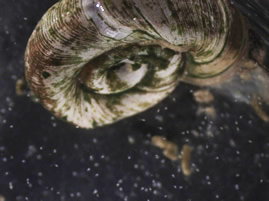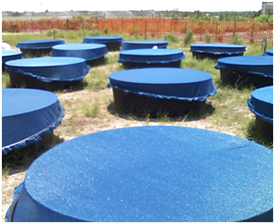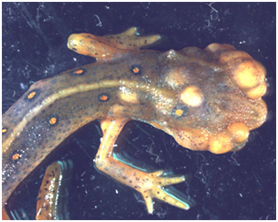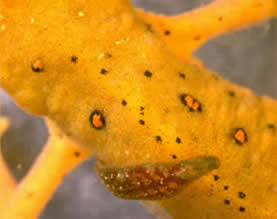
| Thomas Raffel,
Ph.D. Post-Doctoral Researcher |
||
Tom running a temperature experiment Research Projects
Temperature variability and chytridiomycosis
Agrochemical effects on trematode parasites
Parasite community ecology
Seasonal parasitism in red-spotted newts
Leech transmission of amphibian Ichthyophonus |
Contact Information Office: SCA 322 Mailing Address Education |
|
Research Parasitism and disease are increasingly recognized as important factors in animal ecology, capable of influencing population dynamics, reproductive strategies, and patterns of host diversity. But important general questions remain largely unanswered, such as what are the primary drivers of spatiotemporal patterns of parasitism, and are parasite effects on hosts comparable to effects of predators or competitors? To answer these questions, I believe parasite ecologists must work across multiple scales and disciplines, considering potential interactions with factors such as predation, environmental temperature, and host immunity. My approach to determining the important drivers of parasite dynamics is to first derive hypotheses from field patterns and then to test them using manipulative experiments in the field or in mesocosms.
Recent Publications Raffel, T. R., J. O. Lloyd-Smith, S. K. Sessions, P. J. Hudson, and J. R. Rohr. (in press). Does the early frog catch the worm? Disentangling potential drivers of a parasite age-intensity relationship in tadpoles. Oecologia. Jennings, D. E., J. J. Krupa, T. R. Raffel and J. R. Rohr. (in press). Evidence for competition between carnivorous plants and spiders. Proceedings of the Royal Society of London Series B-Biological Sciences. Rohr, J. R., T. R. Raffel, and C. A. Hall*. (in press). Developmental variation in resistance and tolerance in a multi-host-parasite system. Functional Ecology. Raffel, T. R., J. T. Hoverman, N. T. Halstead, P. J. Michel*, and J. R. Rohr. 2010. Parasitism in a community context: Trait-mediated interactions with competition and predation. Ecology. 91:1900-1907. Rohr, J. R. and T. R. Raffel. 2010. Linking global climate and temperature variability to widespread amphibian declines putatively caused by disease. Proceedings of the National Academy of Science of the United States of America. 107: 8269–8274. Raffel, T. R., J. L. Sheingold*, and J. R. Rohr. 2009. Lack of pesticide toxicity to Echinostoma trivolvis eggs and miracidia. Journal of Parasitology. 95: 1548–1551. Raffel, T. R. and T. K. Anderson. 2009. A new species of Hysterothylacium (Nematoda: Anisakidae) from the stomach of the red-spotted newt, Notophthalmus viridescens, from Pennsylvania fishless ponds. Journal of Parasitology. 95: 1503–1506. Rohr, J.R., Swan, A., Raffel, T.R., Hudson, P.J. 2009. Parasites, info-disruption, and the ecology of fear. Oecologia. 159: 447-454 Raffel, T.R., Le Gros, R.J., Love, B.C., Rohr, J.R., Hudson, P.J. 2009. Parasite age-intensity relationships in red-spotted newts: does immune memory influence salamander disease dynamics? International Journal for Parasitology. 39: 231-241 Raffel, T.R., Bommarito, T., Barry, D.S., Witiak, S.M., Shackleton, L.A. 2008. Widespread infection of the Eastern red-spotted newt (Notophthalmus viridescens) by a new species of Amphibiocystidium, a genus of fungus-like mesomycetozoan parasites not previously reported in North America. Parasitology. 135: 203-215 Rohr, J.R., Raffel, T.R., Romansic, J., McCallum, H., Hudson, P.J. 2008. Evaluating the links between climate, disease spread, and amphibian declines. PNAS. 45: 17436-17441 Rohr, J.R., Schoetthofer, A.M., Raffel, T.R., Carrick, H.J., Halstead, N., Hoverman, J.T., Johnson, C.M., Johnson, L.B., Lieske, C., Piwoni, M.D., Schoff, P.K., Beasley, V.R. 2008. Agrochemicals increase trematode infections in a declining amphibian species. Nature. 455: 1235-1239 Raffel, T.R., Martin, L.B., Rohr, J.R. 2008. Parasites as predators: unifying natural enemy ecology. Trends in Ecology and Evolution. 23: 610-618 (invited submission) Rohr, J.R., Raffel, T.R., Sessions, S.K., Hudson, P.J. 2008. Understanding the net effects of pesticides on amphibian trematode infections. Ecological Applications. 18: 1743-1753 Raffel, T.R., Dillard, J.R., Hudson, P.J. 2006. Field evidence for leech-borne transmission of amphibian Ichthyophonus sp. Journal of Parasitolology 92: 1256-1264 Raffel, T.R., Rohr, J.R., Kiesecker, J.M., Hudson, P.J. 2006. Negative effects of changing temperature on amphibian immunity under field conditions. Functional Ecology 20: 819-828 Raffel, T.R., Gatz, A.J. 2003. The orientation of beavers (Castor canadensis) when cutting trees. The Ohio Journal of Science 103: 143-146 Raffel, T.R., Register, K.B., Marks, S.A., Temple, L.M. 2002. Prevalence of Bordetella avium in wild and domestic bird species of eastern USA. Wildlife Diseases 38: 40-4
In the News July 2010 - Parasite of the Day: Hysterothylacium burtii August 2009 - Scientific American: "Is the frog-killing chytrid fungus fueled by climate fluctuations?" May 2007 - The Scientist: "A new dynamic" February 2007 - The Philadelphia Inquirer: "The knotty problem of what infects the newt"
Orginal Raffel Songs Science and conservation songs: “Academic Blues” songs: |
||





